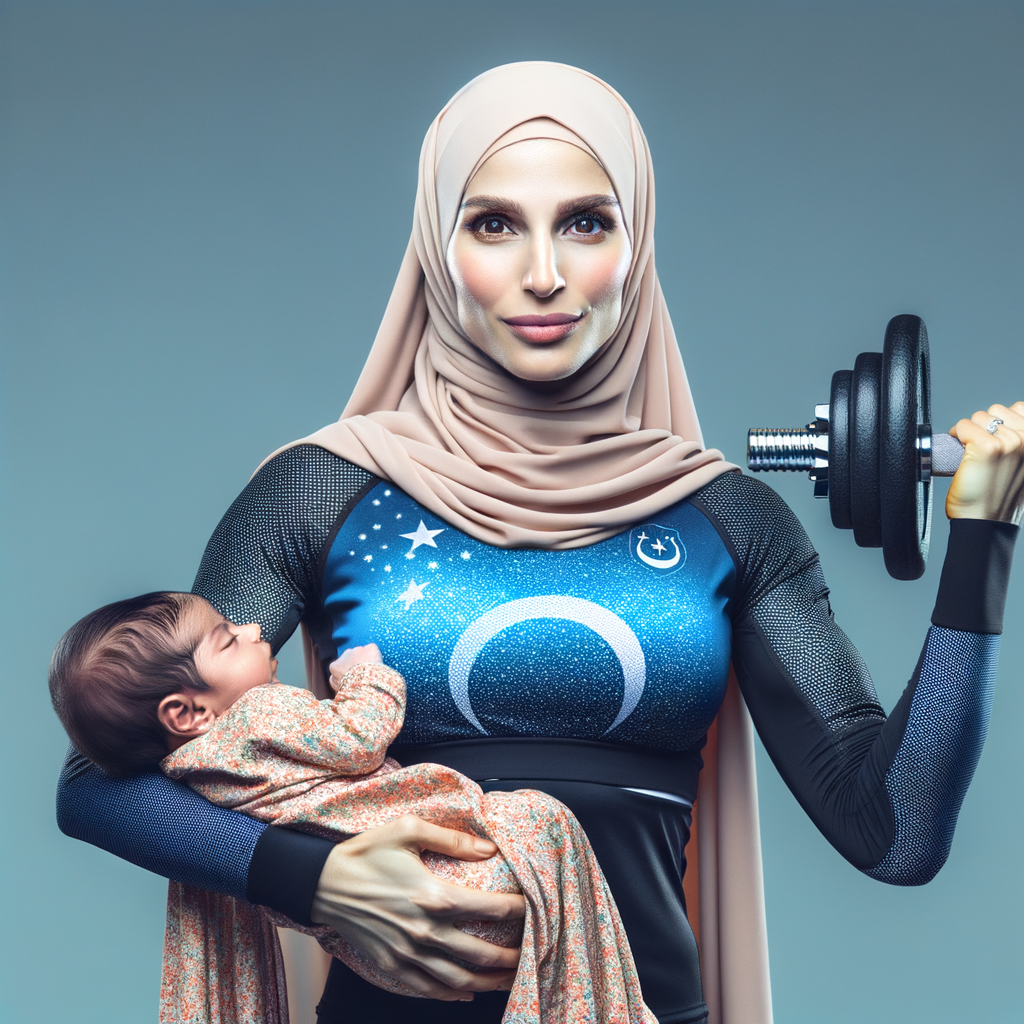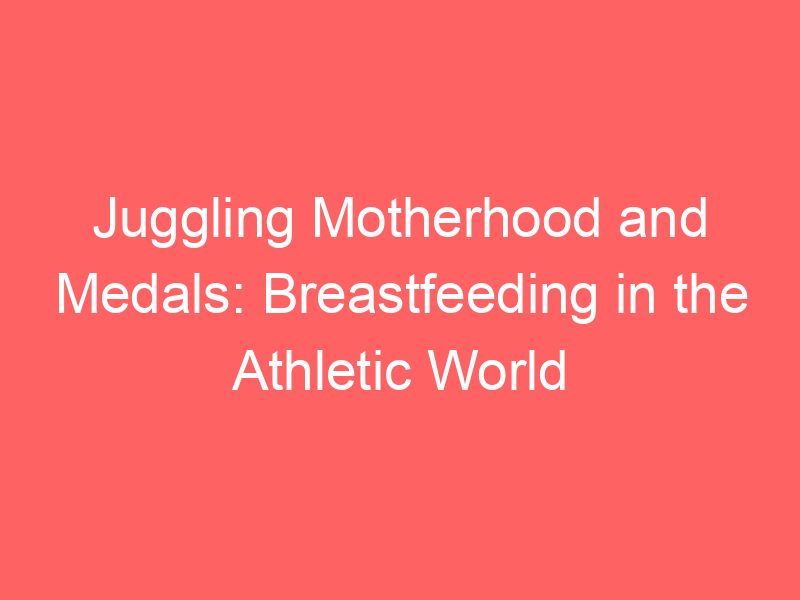The Balancing Act: Breastfeeding Athlete
Being an athlete and a mother is a unique challenge, especially when it comes to breastfeeding. This article will explore the unique challenges faced by athlete mothers, strategies for balancing breastfeeding and sports, and share a case study of an athlete mother’s experience with breastfeeding.
-
- The unique challenges faced by athlete mothers
Athlete mothers face a unique set of challenges. They need to maintain their physical fitness and performance levels while also ensuring they provide adequate nutrition for their babies. This can be a difficult balancing act, as the demands of training and competition can sometimes conflict with the needs of a nursing baby. For example, long training sessions can interfere with regular feeding schedules, and physical exhaustion can impact milk production. Breastfeeding also requires additional calories, which can be challenging to incorporate into a strict athlete’s diet.
-
- Strategies for balancing breastfeeding and sports
Despite these challenges, many athlete mothers successfully balance breastfeeding and sports. Key strategies include planning ahead for feeding and pumping sessions around training and competition schedules, staying hydrated and well-nourished to support milk production, and seeking support from coaches, teammates, and family members. It’s also important to listen to your body and adjust your training intensity as needed to avoid overexertion.
-
- Case study: An athlete mother’s experience with breastfeeding
Consider the case of Jane, a professional runner and mother of two. Jane successfully breastfed both of her children while maintaining her competitive running career. She credits her success to careful planning, a supportive team, and her determination to provide the best nutrition for her children. Jane’s story is a testament to the fact that with the right strategies and support, athlete mothers can successfully balance breastfeeding and sports.
In conclusion, being a breastfeeding athlete can be challenging, but with the right strategies and support, it’s certainly achievable. The key is to find a balance that works for you and your baby, and to be flexible and adaptable as your needs and circumstances change.
Impact of Breastfeeding on Athletic Performance
Let’s delve into the impact of breastfeeding on athletic performance. We’ll explore the physiological changes during breastfeeding, the effects on athletes’ physical performance, and what research has to say about it.
-
Understanding the Physiological Changes During Breastfeeding
During breastfeeding, a woman’s body undergoes several physiological changes. The body produces prolactin and oxytocin, hormones that stimulate milk production and help the milk to flow. This process requires energy, which can affect an athlete’s performance. Additionally, breastfeeding can lead to dehydration, as fluids are used for milk production. This is why it’s essential for breastfeeding athletes to stay well-hydrated.
-
Effects of Breastfeeding on Athletes’ Physical Performance
While breastfeeding, athletes may experience changes in their physical performance. The energy required for milk production can lead to fatigue, which may affect an athlete’s endurance and strength. However, with proper nutrition and hydration, these effects can be minimized. It’s important to note that every woman’s body responds differently to breastfeeding, so the impact on athletic performance can vary.
-
Research Findings: Does Breastfeeding Affect Sports Performance?
Research on the impact of breastfeeding on athletic performance is limited. However, a study published in the Journal of Sports Sciences found that breastfeeding did not significantly affect the physical performance of elite athletes. The study concluded that with the right balance of nutrition, hydration, and rest, breastfeeding athletes can maintain their performance levels.
In conclusion, while breastfeeding can cause physiological changes that may affect an athlete’s performance, these effects can be managed with proper care. Every woman’s experience is unique, and with the right support, breastfeeding athletes can continue to excel in their sports.
Maintaining Athletic Performance While Breastfeeding
Being an athlete and a breastfeeding mother can be challenging, but it’s not impossible. Here are some key tips, professional advice, and a case study to help you maintain your athletic performance while breastfeeding.
- Key Tips for Maintaining Physical PerformanceStaying in top physical shape while breastfeeding requires a balance of proper nutrition, hydration, and rest. Here are some tips:
- Eat a well-balanced diet rich in proteins, carbohydrates, and healthy fats to fuel your body for physical activities and milk production.
- Stay hydrated. Breastfeeding can make you thirsty, and physical activity increases your need for fluids.
- Get enough rest. Your body needs time to recover from workouts and the demands of breastfeeding.
- Professional Advice for Training While BreastfeedingTraining while breastfeeding requires some adjustments. Here’s some professional advice:
- Listen to your body. If you feel tired or weak, it might be a sign that you need to slow down or take a break.
- Consider working with a professional trainer who understands the unique needs of breastfeeding athletes.
- Remember, it’s okay to modify your training routine. You might not be able to train at the same intensity as before, and that’s okay.
- Case Study: A Professional Athlete’s Journey Through Breastfeeding and TrainingLet’s look at the journey of a professional athlete who successfully balanced breastfeeding and training.
Serena Williams, a world-renowned tennis player, returned to her sport just months after giving birth to her daughter. She continued to breastfeed while training for her comeback. Serena’s journey shows that with the right balance and support, you can maintain your athletic performance while breastfeeding. You can read more about her journey here.
Breastfeeding and Training Balance
As a breastfeeding athlete, maintaining a balance between your training schedule and your breastfeeding routine can be challenging. However, with a flexible training schedule, proper nutrition, and adequate rest, you can achieve this balance. Let’s delve into these aspects:
-
- Creating a Flexible Training Schedule
Creating a flexible training schedule is crucial for breastfeeding athletes. It allows you to adjust your workouts around your baby’s feeding times. For instance, you could schedule your training sessions during your baby’s nap times or when another caregiver is available. Remember, your baby’s needs come first, and your training schedule should accommodate this.
-
- Nutrition Tips for Breastfeeding Athletes
Proper nutrition is essential for all athletes, but it’s even more critical for breastfeeding athletes. You need to consume enough calories to fuel your workouts and produce breast milk. Include a variety of nutrient-dense foods in your diet, such as fruits, vegetables, lean proteins, and whole grains. Stay hydrated by drinking plenty of water, especially before, during, and after workouts.
-
- Importance of Rest and Recovery
Rest and recovery are just as important as your workouts. They allow your body to heal, rebuild muscles, and replenish energy stores. As a breastfeeding athlete, you need to ensure you’re getting enough sleep. Try to nap when your baby naps and aim for at least 8 hours of sleep each night. Remember, a well-rested athlete is a better performing athlete.
In conclusion, balancing breastfeeding and training requires a flexible approach, good nutrition, and plenty of rest. By following these tips, you can maintain your athletic performance while ensuring your baby gets the best nutrition.
Support Systems for Breastfeeding Athletes
When it comes to balancing breastfeeding and athletic training, support systems play a crucial role. They provide the necessary emotional, physical, and professional assistance that breastfeeding athletes need to thrive. Let’s delve into the different types of support systems available.
-
- Role of Family and Friends
Family and friends are the first line of support for breastfeeding athletes. They provide emotional encouragement, help with childcare, and often assist with meal preparation. A study from the University of Washington found that the support of loved ones significantly improves the breastfeeding experience for mothers, including those who are athletes.
-
- Professional Support: Coaches, Trainers, and Medical Professionals
Coaches and trainers can help design flexible training schedules that accommodate a breastfeeding athlete’s needs. They can also provide advice on nutrition and recovery strategies. Medical professionals, on the other hand, can offer guidance on maintaining optimal health for both the mother and the baby. They can address any concerns related to breastfeeding and athletic performance.
-
- Community Support: Groups and Organizations for Athlete Mothers
Community support groups and organizations provide a platform for breastfeeding athletes to share experiences, seek advice, and find encouragement. These communities can be found both online and offline. For instance, the La Leche League is an international nonprofit organization that offers support and information about breastfeeding to all mothers, including athletes.
In conclusion, the role of support systems cannot be overstated for breastfeeding athletes. They provide the necessary assistance and resources that enable these athletes to successfully balance their athletic pursuits with their breastfeeding commitments.
Overcoming Challenges: Breastfeeding and Sports Performance
Being an athlete and a breastfeeding mother presents unique challenges. But with the right approach, these challenges can be overcome. Here, we discuss common obstacles, solutions, and key takeaways for athlete mothers.
-
- Common obstacles faced by breastfeeding athletes
Many athlete mothers face a number of challenges when it comes to breastfeeding. These include physical exhaustion, dehydration, maintaining a balanced diet, finding time for training and breastfeeding, and dealing with societal pressure. Breastfeeding while maintaining a high level of athletic performance requires a lot of energy and can be physically demanding.
-
- How to overcome these challenges
Overcoming these challenges requires careful planning and support. Athlete mothers should ensure they are well-hydrated and consuming a balanced diet to maintain their energy levels. It’s also important to schedule training around breastfeeding times to ensure both activities can be effectively managed. Seeking support from coaches, teammates, and family can also be beneficial.
-
- Key takeaways for athlete mothers
Being a breastfeeding athlete is challenging, but not impossible. Here are some key takeaways:
-
- Stay hydrated and maintain a balanced diet.
- Schedule training around breastfeeding times.
- Seek support from those around you.
- Remember, your health and your baby’s health come first.
In conclusion, being a breastfeeding athlete requires careful planning and support. But with the right approach, it’s possible to maintain a high level of athletic performance while providing the best nutrition for your baby.
Future of Breastfeeding in the Athletic World
As we look towards the future, there are promising signs of change in the world of sports, particularly for breastfeeding athletes. Let’s delve into the key areas of transformation.
-
- Changes in Policy and Culture
There has been a significant shift in the policies and culture surrounding breastfeeding in the athletic world. More and more, organizations are recognizing the importance of supporting breastfeeding athletes. This is evident in the introduction of policies that accommodate breastfeeding schedules, and the provision of facilities for breastfeeding or pumping during events. This change in culture is also reflected in the attitudes of coaches and teammates, who are becoming more understanding and supportive.
-
- Increasing Support for Athlete Mothers
Support for athlete mothers, particularly those who are breastfeeding, is on the rise. This is seen in the increasing number of resources available, such as lactation consultants and breastfeeding-friendly sports gear. Additionally, many sports organizations are now providing education and training to their staff on how to support breastfeeding athletes.
-
- Case Study: A Look at an Organization Supporting Breastfeeding Athletes
One organization that is leading the way in supporting breastfeeding athletes is the Women’s Sports Foundation. They have implemented policies that ensure breastfeeding athletes are not discriminated against and are provided with the necessary facilities and support. This includes time for breastfeeding or pumping, and access to a private, clean space for these activities. The foundation’s efforts serve as a model for other organizations and highlight the positive changes that are possible.
In conclusion, the future of breastfeeding in the athletic world looks promising. With changes in policy and culture, and increasing support for athlete mothers, breastfeeding athletes can look forward to a more inclusive and supportive environment. The case of the Women’s Sports Foundation serves as a beacon of hope and a model for other organizations to follow.














